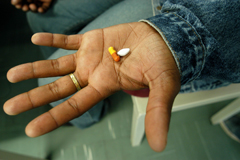 The 2007 HIV/AIDS Implementers’ Meeting is
The 2007 HIV/AIDS Implementers’ Meeting is
expected to attract over 1,500 people under the
theme ‘scaling up through partnerships’.Donors, AIDS experts and implementers from around the world are gathering in Kigali, Rwanda to attend the 2007 HIV/AIDS Implementers’ Meeting.
The meeting, hosted by the government of Rwanda and cosponsored by PEPFAR, the Global Fund to Fight AIDS, Tuberculosis and Malaria; the UNAIDS Secretariat, UNICEF, WHO and the World Bank, will take place from 16-19 June and is expected to attract over 1,500 people under the theme ‘scaling up through partnerships’.
Participants will include civil society representatives, donors, governments, UN organizations and non governmental organizations, who will share concrete, country-level programmatic examples of what’s working in the AIDS response and what needs improvement.
In past years the meeting has served principally as an annual gathering for the U.S. Government and its global AIDS grantees, but this year, the 2007 HIV/AIDS Implementers Meeting has adopted a much broader scope and involved many more partners.
“We have worked closely with the US government, the Government of Rwanda and other partners over the past few months to help shape the meetings structure and agenda,” said Dr Kékoura Kourouma, UNAIDS Country Coordinator in Rwanda. “The strong participation of many international cosponsors––combined with the exemplary leadership of the Government of Rwanda––is a strong signal of the increasing and very necessary, coordination and collaboration now evident in the global AIDS response,” he added.
 More than 500 project summaries will be presented,
More than 500 project summaries will be presented,
representing some of the many HIV prevention, care
and treatment programmes being implemented
around the world. Unlike the biannual International AIDS Conferences, and other similar meetings, which primarily provide a platform for exchanging research findings, announcing important technological advancements and advocating around global AIDS policy issues, the 2007 HIV/AIDS Implementers Meeting will focus specifically on implementation.
Issues will be raised on; how best to coordinate as more partners become involved in the AIDS response; how to maximize on lessons learnt, on resources raised and on the leadership that has been leveraged to scale up HIV prevention, treatment, care and support on the ground to move the AIDS response to the next level.
More than 500 project summaries will be presented, representing some of the many HIV prevention, care and treatment programmes being implemented around the world.
Summaries include:
- Integrating HIV and TB services in district hospitals in Kenya.
- District level planning, monitoring and evaluation capacity – Experience of Rwanda
- Contracting––‘Retired but not yet tired’ Health staff in Tanzania.
- Involvement of traditional birth attendants for the prevention of mother to child transmission of HIV in Uganda.
- Know your epidemic – Secondary School Communications clubs for behaviour change.
- The impact of safe blood-bank screening and transfusion practices in Mozambique.
- Challenges of HIV testing and counselling in health facilities, all countries.
Through sharing lessons learnt in the scale-up of AIDS programmes, the meeting will promote an open dialogue about future directions with a strong emphasis on implementation and identification of critical barriers that are causing ‘bottlenecks’ in terms of getting vital resources to the people that need them most and ‘making the money work’.
“This meeting will be a real opportunity for partners in the AIDS response to come together to tackle the tough challenges and move forward with one voice to accelerate and sustain global AIDS efforts,” said Michel Sidibe, UNAIDS Deputy Executive Director. “Only through joint efforts from all sectors and at all levels, will we be able to move towards universal access to HIV prevention, treatment, care and support–– especially towards implementation––this meeting is an important step in making this possible,” he added.
Links:
Read press release ( en | fr | kr )
Read speech delivered by Michel Sidibe, UNAIDS Deputy Executive Director on behalf of Dr Peter Piot, UNAIDS Executive Director
Visit the implementers' meeting web site





